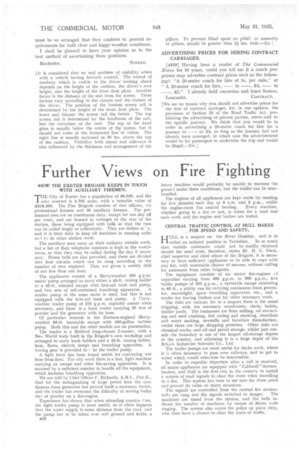Further Views on Fire Fighting
Page 56

If you've noticed an error in this article please click here to report it so we can fix it.
'HOW THE EXETER BRIGADE KEEPS IN TOUCH WITH AUXILIARY FIREMEN.
THE City of Exeter has a population of 66,029, and the area covered is 4,702 acres, with a rateable value of £618,500. The Fire Brigade consists of two officers, six
professional firemen and 30 auxiliary firemen. The permanent men are on continuous duty, except for one day off
per week, and are housed in cottages at the rear of the station, these being equipped with bells so that the men can be called singly or collectively. They are drilled dr.-y, and it is their duty to keep all machines in running order an I ti do other station work.
The auxiliary men carry on their ordinary outside work, but a list of their telephone numbers is kept in the watchroom, so that they may be called during the day if necessary. House hells are also provided, and these are divided• into four circuits which can be rung according to the number of men required. They are given a weekly drill of not less than one hour.
• The appliances consist of a Merryweather 350 g.p.m. motor pump arranged to carry either a 45-ft. raising ladder or a 45-ft. wheeled escape with first-aid tank and pump, and two sets of self-contained breathing apparatus. A similar pump of the same make is used, but this is not equipped with the first-aid tank and pump. A Merryweather trailer pump of 275 g.p.m. capacity assists when necessary, and there is a foam trailer carrying 20 tins of powder and the generator with its hose.
Of particular interest is the Dorman-en glued Merryweather 85-ft. turntable escape with 400-gallon turbine pump. Both this and the other models are on pneumatics.
The tender is a Bedford long-chassis 2-tonner, with a Net/ World body built in the Brigade's own workshop and
arranged to carry hook ladders and a 45-ft. raising ladder, hose, flares, electric lamps and breathing apparatus. A towing gear is provided to ". ke the trailer pump.
A light lorry has been found useful for conveying wet hose from fires. For city work there is a fast, light machine carrying an escape and other life-saving apparatus. It is manned by a sufficient number to handle all the equipment, which includes breathing apparatus.
We are told by Chief Officer F. Richards, A.M.I., Fire.E., that for the extinguishing of large petrol fires the con tinuous foam generator has proved itself a necessary factor, and the trailer has overcome the difficulty of storing bulky tin; of powder on a fire-engine.
Experience has shown that when attending country free, the light trailer pump is most useful, as it often happens that the water supply is some distance from the road, and the pump has to be taken over soft ground and fields; a n3S
heavy machine would probably be unable to traverse the grount under these conditions, but the trailer can be manhandled.
The engines of all appliances are kept warm by running for five .minutes each day at 9 a.m. and 5 p.m., whilst the engine-room has central heating. Every machine, whether going to a fire, or not, is taken for a road test each week, and the engine and brakes are tested.
CENTRAL TRAFFIC CONTROL AT HULL MAKES FOR SPEED AND SAFETY.
HLILL is a seaport on the River Humber, and is in rather an isolated position in Yorkshire. In so much that outside assistance could not be readily obtained should the need arise; therefore, states Mr. H. G. Duck, chief inspector and chief officer of the Brigade, it is necessary to have sufficient 1-pplia.nces to be able to cope with any fire, with reasonable chance of success; without callMg for assistance from other brigades.
The equipment consists of six motor fire-engines cf capacities varying from 400 g.p.m. to 900 g.p.m., five trailer pumps of 250 g.p.m., a turntable escape extending to 85 ft., a ntility van for carrying continuous foam generator, searchlight, spare breathing apparatus, etc., and a tender for towing trailers and for other necessary work.
The risks are various, for in a seaport there is the usual shipping, with the necessary warehouses, sbeds,' bonds, timber yards. The businesses are flour milling, oil extracting and seed crushing, fish curing and smoking, chocOlate arid sweet making, sawmills and furniture manufacture, whilst there are large shopping premises. Other risks are chemical works, and oil and petrol storage, whilst just outside the boundary is one of the largest oil-storage depots in the country, and adjoining it is a large depot of the BriLish Industries Solvents Co., Ltd.
The trailer pumps are most useful for docks work, where it i; often necessary to pass over railways, and to get to water which' would otherwise be inaccessible. In order to expedite departure after. a call is received, all major appliances are equipped with "Caldwell" thermoheaters, and Hull is the first city in the country to install a system of road signals to clear the route when travelling to a fire. This system has been in use now for three years and proved its value on many occasions.
The signals are controlled from the central fire station; bells are rung and the signals switched to danger. The machines are timed from the station, and the bells indicate the number of machines by means of Morse code ringing. TI e system also warns the police on point duty, who then have a chance to clear the route of traffic.




































































































